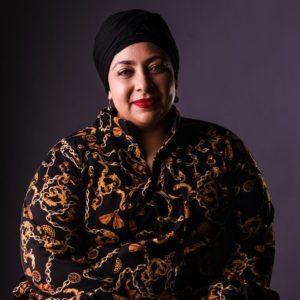Responding to the Public Interest Media Crisis
January 31, 2022
 Independent public interest media has proven to be a critical component of free democracies around the world and plays a major role in efforts to counter misinformation and disinformation.
Independent public interest media has proven to be a critical component of free democracies around the world and plays a major role in efforts to counter misinformation and disinformation.
The International Fund for Public Interest Media (IFPIM) works to counter the existential threats against public interest media, with a particular focus on resource-poor and fragile settings. A sponsored project of Rockefeller Philanthropy Advisors (RPA), IFPIM recognizes the critical role of a free press in democracies and provides support for independent media amid challenges including funding shortages, political attacks, and the spread of misinformation and disinformation.
IFPIM has received recognition recently for their work. IFPIM Co-Chair Maria Ressa received the Nobel Peace Prize for her work in safeguarding the freedom of expression. And in his remarks at the Summit for Democracy in December 2021, U.S. President Joe Biden highlighted IFPIM’s work and announced the United States’ commitment to providing $20 million in critical funding, joining several other countries who have pledged their support.
Khadija Patel, IFPIM’s head of programs, spoke with RPA to explain the origins of IFPIM, the funding crisis faced by public interest media, and the role of the free press in democracies.
Please tell us about your journey as a journalist and how that work led you to IFPIM.
Being a journalist is the culmination of my childhood dream and the realization of my interests and curiosities. But I’ve also been on the wrong end of the upheaval in our industry, particularly in the so-called Global South, where the business model for news media has completely collapsed, to the detriment of the ability of newsrooms to hire journalists and to do quality journalism—particularly public interest journalism.
I often tell the story that when I got to the Mail and Guardian, my mom said to me, “You’re always working for people who don’t have money.” I can understand where she was coming from, having only seen me in jobs where there’s a heightened sense of precarity. In fact, the Mail and Guardian was my first foray into so-called legacy media; until that point, I had only ever worked in digital startups.
Overall, my experience has largely involved working in media during the early days of what the internet proposed as a force for liberation and freedom of speech and its potential to connect people around the world and with the emergence of Web 2.0 and social media. The news media was initially excited by the kind of scale promised by platforms like Facebook and started building business models premised on the hopes of Facebook bringing more traffic. Of course, that traffic can dwindle in one fell swoop when Facebook changes its algorithm; simultaneously, they have completely eclipsed our ability to win any advertising.
I’ve been at the forefront of trying to be a journalist in these conditions. I’ve been a startup founder and a manager. And in all these contexts, I’ve understood the limitations of both the market approach to keeping media alive and the existing paradigms of philanthropy.
So, when I was approached by IFPIM, I felt like it was important for me to do this work, because I’ve been on the other side of the table and I’ve been frustrated by some of the ways of thinking and approaches to journalism, particularly in the Global South. To me, IFPIM has transformative potential. It’s bold, it’s about making a fundamental difference, but at its core, it asserts the value of journalism to societies and to humanity. That’s why I’ve come to IFPIM to work on strategies to keep this work going.

Khadija Patel
How was IFPIM conceived and how has it evolved?
IFPIM was first conceived out of a blog post written three years ago by our colleague James Deane, a seasoned media development practitioner who has advised several governments and serves as Head of Policy for BBC Media Action. In this blog post, James drew attention to the urgent need for new funding for media in the Global South and proposed bold action to pull resources in new ways and fast.
James then partnered with Nishant Lalwani, managing director at Luminate, one of the largest private funders to media. Luminate funded a detailed feasibility study that was published in February 2020, just as the Covid-19 pandemic was beginning to spread around the world. The feasibility study was conducted with significant consultation with some of the best brains in media around the world—journalists, funders, and academics—and was published and distributed globally.
The next major step was the hiring of Sheetal Vyas as IFPIM’s executive director in February 2021. She quickly funding for the Secretariat, which then allowed us to hire a few more people, including Colin Crowell, myself, and Pierrick Judéaux. So, our team is growing; that’s been our trajectory in terms of building the organization.
During this setup phase, it’s been a huge help for us to be housed within RPA, which has taken away a lot of the administrative burden in terms of our operations. RPA’s expertise and in-house legal and financial services have benefited us a great deal.
Throughout this process, what’s been essential is having significant conversations with government representatives around the world to make the case for IFPIM; to allow new understandings; to engage with people; and to understand how to respond to people’s reservations. We’re also making the case for swift funding because the pandemic has exacerbated the funding crisis; in fact, the UN has called the pandemic a media extinction event.
Our fundraising efforts have also been crucial, along with building our board. We have some of the most exciting and respected people in the media leading our board: Maria Ressa and Mark Thompson. It was fortuitous timing that within days of being named co-chair of IFPIM, Maria was announced as a joint winner of the Nobel Peace Prize. That was rewarding for us as an organization but also as an industry: the Nobel committee’s decision signaled an understanding of the profound crisis facing the media.
One of IFPIM’s core objectives is to address what it calls a “public interest media crisis.” What does that entail?
The funding crisis facing media right now means that there is less money and resources for public interest journalism. There is a weakened ability to do stories about things that hold power to account; about things that influence the quality of life of people; about whether people can access public services; about how governments spend money; and about whether there is transparency in the political process. There are fewer and fewer of those stories being told.
The very real consequence is that we lose a sense of complexity in our world. As individuals, we are complex beings, but as societies, we are even more complex—as cities, states, and regions, we are extremely complex. The news media allows us the ability to understand some of that complexity, to understand who we are and what’s happening around us in real-time. But our ability to understand the complexity of who we are is being curtailed. That, unfortunately, fuels populists because we have more simplistic understandings of who we are and what’s happening around us. It’s the populist leaders who thrive on simplistic narratives.
For the good of humanity, we deserve better leaders who understand the full complexity of human beings. We need that for a more peaceful society. We need the media. That’s why I think that IFPIM’s work is particularly important.
In recent years, we’ve seen attacks on both democracy and the free press around the world. How are those threats related?
In many ways, a strong free press is implicit in strong democracies. Often, the first signal of a rising autocracy involves a muzzling of the media—laws or regulations that stifle the ability of the news media to operate freely. Therefore, we must act in cohort with other organizations as part of a systemic response. It’s why we’ve consulted with media freedom organizations, with academics, and indeed with politicians around the world.
This is important because this fund should not be an imperial instrument. It shouldn’t be based on the whims of someone sitting in Brussels or New York or DC or London. Rather, it should be an instrument that furthers the needs of people on the ground, where it is meant to benefit them. When we think about strengthening democracy, we also need to be democratic in the way that we approach grantmaking and to ensure that our strategies are informed by the reality on the ground, that the people that this is meant to benefit are the ones informing our decisions.
More broadly, when it comes to democracy, the media is often what’s been described as the canary in the coal mine. That’s why the Fund plays an important role in strengthening the financial viability of public interest media. But we must work in collaboration with others working for the health and security of media around the world.
What’s unique about IFPIM’s approach to grantmaking and partnerships?
We’re very excited to hopefully kick off grantmaking in 2022. As we do so, we need to ensure that we can make an impact in the regions that we work in. There are going to be difficult decisions that will have to be made, and perhaps we won’t get it all right immediately. However, we’re trying to build a live learning environment for both our grantees and ourselves to ensure that we’re constantly learning and iterating our approach based on what is and isn’t working.
What’s important is that this is a multilateral instrument in which no one donor will have an outsized influence in grantmaking decisions. On the contrary, decisions will be made by an independent board. That’s why it’s a brave decision for any state to commit funds to IFPIM because it requires them to take their hands off to just commit to the health and viability of news media.
What stands out about IFPIM is that we hope to be building an instrument that is a symbol of multilateralism in the current day at a time when you know when global politics appears to be so fractured. We hope that IFPIM will be a call for us to work together as a global community.
Photo by Bank Phrom on Unsplash
Back to News